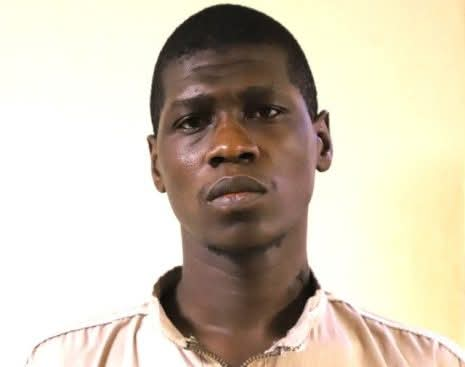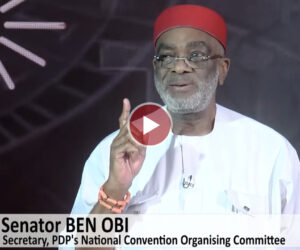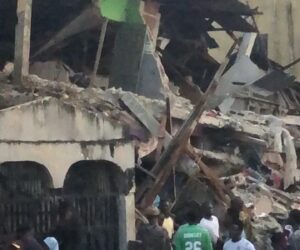A Federal High Court sitting in Abuja Wednesday sentenced a leader of the Islamic State West Africa Province (ISWAP), Hussaini Ismaila, to twenty years’ imprisonment.
Ismaila, who was prosecuted by the Department of State Services (DSS) on terrorism charges, was convicted by the trial judge, Justice Emeka Nwite.
The conviction is coming as the federal government announced its resolve to unleash full military might against terrorists and other criminal elements threatening the security of lives and property of the citizens.
…The judgement
The court handed down the verdict after Ismaila (aka Mai Tangaran) pleaded guilty to a four-count terrorism charge brought against him by the DSS.
Ismaila, according to the prosecution, was the coordinator of the 2012 attacks on Police Headquarters in Bompai, Mobile Police Base, Kabuga Road, Pharm Centre Police Station and Angwa Uku Police Station, all in Kano state, among other places, in which many were injured.
Shortly after his arrest on August 31, 2017, at Tsamiyya Babba village, Gezewa local government area of Kano state, Ismaila was arraigned on a four-count charge brought under the Terrorism Prevention Amendment Act, 2013.
The trial suffered delays resulting from appeals and the conduct of a trial-within-trial to, among other things, ascertain the voluntariness of the defendant’s extra-judicial statements.
However, at the opening of the trial, the prosecution called five witnesses, including two DSS officials and two eyewitnesses to some of the attacks.
Ismaila, who had earlier pleaded not guilty during his arraignment, changed his plea to guilty after the testimony of the fifth prosecution witness.
Subsequently, the defendant’s lawyer, P. B. Onijah from the Legal Aid Council (LAC), pleaded with the court to be lenient with the defendant.
Onijah said Ismaila was remorseful and therefore changed his plea to avoid wasting the court’s time, and regretted being involved in terrorism.
In his judgment, Justice Nwite found Ismaila guilty of the offences charged and sentenced him to 15 years in relation to count one; and 20 years on counts two, three, and four.
…FG’s renewed effort
Meanwhile, the federal government said President Bola Ahmed Tinubu was placing the nation’s security architecture on the highest level of alert in response to recent attacks across parts of the country.
Minister of Information and National Orientation Mohammed Idris said this Wednesday at a press briefing in Abuja.
In a statement by his media aide, Rabiu Ibrahim, the minister conveyed the president’s sympathies to families and communities affected by the recent acts of terrorism and criminality.
“Let it be known that President Tinubu has put our nation’s security apparatuses on the highest alert ever, and has deployed to actively pursue and eliminate terrorists, bandits, and criminal elements wherever they may be in Nigeria. Our security forces have also been mandated to swiftly rescue the abducted Kebbi school girls and reunite them with their families,” said Idris.
The minister described the killing of a senior army general, the abduction of students in Kebbi state, and the attack on a church in Kwara state as “painful reminders of the threats confronting the nation,” adding that such acts only strengthen the federal government’s resolve to decisively defeat terrorism and banditry.
He also said President Tinubu had postponed his scheduled international engagements, including the G20 meeting in South Africa, to focus squarely on domestic security developments, adding that the president directed the military and the police to deploy additional personnel to Eruku and the entire Ekiti local government area of Kwara state, ensuring strong security coverage and rapid response.
Idris further stated that Vice President Kashim Shettima was currently in Birnin Kebbi, at the president’s instruction, holding engagements with the governor, Nasir Idris, security chiefs, traditional rulers, and families of the abducted schoolgirls.
“President Tinubu has also directed all security agencies to actively pursue, neutralise, and dismantle terrorists and criminal networks across the country,” said Idris.
He assured Nigerians that the rescue of the abducted Kebbi schoolgirls remains an urgent national priority.
Addressing attempts to frame the security situation along religious lines, he said the federal government “categorically refutes any sectarian interpretation” of the situation.
While emphasising that terrorism was affecting adherents of all faiths, he said: “In this critical moment, national unity is our most powerful asset. We must reject misinformation and division. Our common enemies are terrorists and criminals seeking to destabilise our country.”
…SGF Akume urges unity
Speaking in similar vein, the Secretary to the Government of the Federation (SGF), Senator George Akume, said U.S. President Donald Trump’s designation of Nigeria as a Country of Particular Concern (CPC) has emboldened terrorists in further perpetrating their criminal acts.
He also said the current security challenge being faced by Nigeria was fallout of destabilisation that followed the 2011 Libya and Egypt uprisings.
To this end, the SGF appealed “to the sense of patriotism of all Nigerians irrespective of tribe, religion or political persuasions that now is the time to speak with one strong and united voice to confront a common enemy.
“The terrorist, bandits and extremists, insurgents, and completely eradicate them from our national borders.”
Senator Akume said this Wednesday at a press conference in Abuja, to clarify Trump’s genocide claim against Nigeria’s Christian community.
While noting that no credible international institution has designated the crisis as genocide against Christians, the SGF said: “Boko Haram/ISWAP attack both churches and mosques, killing Muslims and Christians alike. Bandits target all communities without religious distinction. Victims include Christians, Muslims, and traditionalists, confirming that the drivers are economic and ideological, not religious extermination.
“The current misrepresentation of the crisis as “genocide against Christians” fuels dangerous religious tensions, emboldens extremist and criminal factions seeking to exploit sectarian narratives, creates diplomatic frictions based on inaccurate interpretations, and undermines Nigeria’s longstanding efforts to build constructive international security partnerships.”
In a strategic overview, Akume noted that the nation’s contemporary security challenge has evolved across two major fronts of the Northeast ideological insurgency from 2002 to date, and the banditry in the northwest which started in 2018.
The insurgency, he said, “began as a local extremist movement but quickly drew ideological inspiration and tactical guidance from global terrorist currents propagated by Al-Qaeda, later transforming through ISIS influence into Boko Haram and ISWAP.”
And on banditry, he said: “This is driven overwhelmingly by economic incentives, including illegal mining, cattle rustling, kidnapping-for-ransom, extortion, and territorial control. While opportunistic linkages exist with terrorist smuggling networks in the Sahel, the motivation remains primarily economic deterministic rather than religious.
“Across Nigeria, Christians and Muslims have been equally victimised. No credible international organisation has ever classified the crisis as genocide against Christians or any group.”
On the North African connection, Akume said: “The collapse of the Libyan state allowed Al-Qaeda-aligned traffickers to loot and disperse heavy weapons across the Sahel.
“Egypt’s instability further opened corridors for extremist ideologies and foreign fighters’ influence.
“Weapons flowing through AQIM-controlled smuggling routes entered West Africa and Nigeria, strengthening Boko Haram, ISWAP and later banditry networks.”
He said Christians and Muslims had suffered equally, with attacks targeting churches, mosques, towns and villages without religious distinction.
“These are not religious wars. They are ideological and economic crimes, and misrepresenting them as genocide against any group undermines Nigeria’s security and diplomatic efforts,” he said.
While explained that Nigeria entered the early phase of the insurgency without adequate legal tools to counter terrorism, he said the federal government responded by enacting the Terrorism Prevention Act (2011) and its amendment in 2013, establishing the modern counter-terrorism framework used today.
…North-west, Plateau, Benue
On the North-West crisis, Akume stressed that banditry remains “purely economic-deterministic.”
He highlighted illegal mining of gold and other minerals in Benue, Kaduna, Katsina and Zamfara; cattle rustling; extortion; kidnapping-for-ransom; illegal taxation of rural communities; and competition over grazing routes and water as the core drivers of violence.
The SGF said that while some linkages with Sahelian smuggling networks exist, the motives were overwhelmingly financial rather than religious.
The SGF also addressed the humanitarian impact of recent mass-casualty incidents, including the Yelewata attack in Guma LGA of Benue state between June 13 and 14, 2025, where at least 100 people were killed according to Amnesty International and international media agencies.
The SGF called for discretion and deeper strategic cooperation rather than public labelling that could worsen the situation.
Akume reaffirmed Nigeria’s confidence in its armed forces, describing them as experienced and capable, having reclaimed territories and weakened terrorist leadership structures across multiple theatres.
“Nigeria does not require foreign troops. What is needed is targeted support from partners, especially the United States, in the areas of intelligence cooperation, technology and military equipment support for advanced engagement against the insurgents,” he said.
…Stabilising the security environment
The SGF also outlined key priorities to stabilise the security environment, including intensified nationwide operations, expanded intelligence sharing, strengthened tracking of illegal financial flows from mining and trafficking, improved rural security and border governance and strict adherence to human rights safeguards.
Akume emphasised that the United States and Nigeria, as leading democracies on their respective continents, shared a responsibility to promote global stability and confront extremist threats collaboratively.
He reaffirmed Nigeria’s commitment to strengthening diplomatic ties with the U.S. on the basis of mutual respect and reciprocity.








